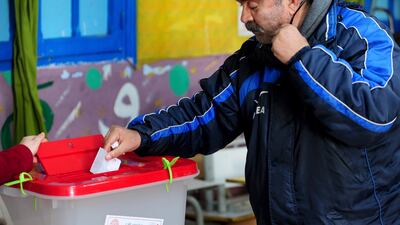Tunisians began voting for members of the next parliament’s House of Representatives on Sunday morning.
Only 4.71 per cent of registered voters in 131 constituencies had cast their ballots in the first two hours of polling for the second round of the legislative elections, said Farouk Bouasker, president of Tunisia's Independent High Authority for Elections.
Mr Bouasker called the turnout “respectable”, following the 2.95 per cent recorded during the same time slot in the first round.
He said the polling process was proceeding smoothly, with no significant irregularities taking place.
There are 7,853,447 people eligible to participate in the second round, with 369,561 having already voted, he said.
Polling booths opened at 8am on Sunday and were due to close at 6pm.
Under the new electoral law, voters are casting ballots for individual candidates instead of party lists. A total of 262 candidates, 228 men and 34 women, are competing for the remaining seats in the House of Representatives.
Elections for the second chamber, the National Council of Regions and Districts, have not been scheduled.
Preliminary results will be announced on February 1, with the final result officially revealed on March 4, said the ISIE.
“I hope the person we voted for would bear enough consciousness about the situation and stand with us,” Salem Naouar, 78, whose family have resided in La Marsa district for generations, told The National after casting his ballot at La Marsa Taeib Mhiri elementary school polling station on Sunday morning.

Fathi Bouach, director of Taeib Mhiri Elementary School polling station, said turnout in the second round of parliamentary elections was better than in the first round.
“This time we only have two candidates rather than seven like last time, I think that makes the [voter’s] vision clearer,” Mr Bouach said.
“We still hope it gets even better, especially with youth voters, whose participation remains low [at] this hour.”
Mohamed, 60, cast his vote in La Marsa district.
“I voted today to help the July 25 process succeed,” he told The National.
“These elections are on individuals, unlike the previous system, we want to give it a shot instead of the previous parliament who ruined the country.”
Sunday’s elections mark the first time that Manoubia Dhaou, 51, has voted. She hopes her vote will ring the reforms her district of La Marsa needs and elect a representative who cares for voters.
She said: “I suffer from asthma and have three kids. One of them has a disability, and no one ever helped me. I hope the situation changes and we would not have people [MPs] getting paid without doing things for the people.”
Tunisian president Kais Saied suspended the previous parliament in July 2021, citing a threat to the country as the reason behind his decision.
He dissolved the house early 2022 and introduced a new constitution that was passed in a referendum in July of the same year.
The first round of the parliamentary elections took place on December 17, with a record low turnout that critics say does not qualify as a minimum threshold that would give the coming parliament any legitimacy.
The country is experiencing its worst economic crisis to date, with an increasing inflation rate that is expected to reach 10.5 per cent in 2023.
The Tunisian government is seeking to reach a bailout agreement from the International Monetary Fund to fund its budget this year.
Minister of Economy Samir Said said that the government received “positive and supportive signs” about the loan from the international lender following the Tunisian delegation’s participation at the Davos Economic Forum earlier this month.
Tunisian citizens, however, continue to criticise the government's performance as essential commodities and food continue to disappear from supermarkets’ shelves, in addition to intended increased austerity and taxation this year.
With such an economic crisis affecting the daily lives of citizens, critics doubt the election of a new parliament will bring the solutions the people hope for and the country needs.


